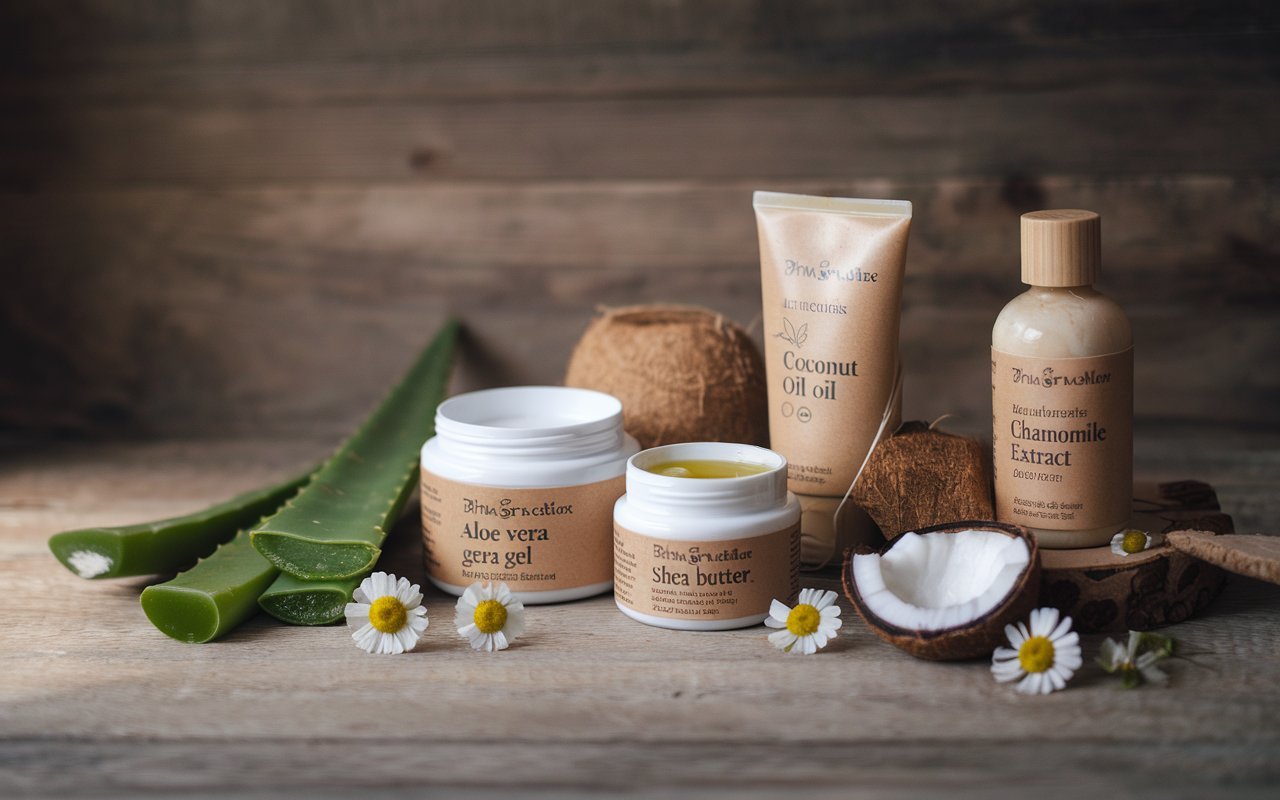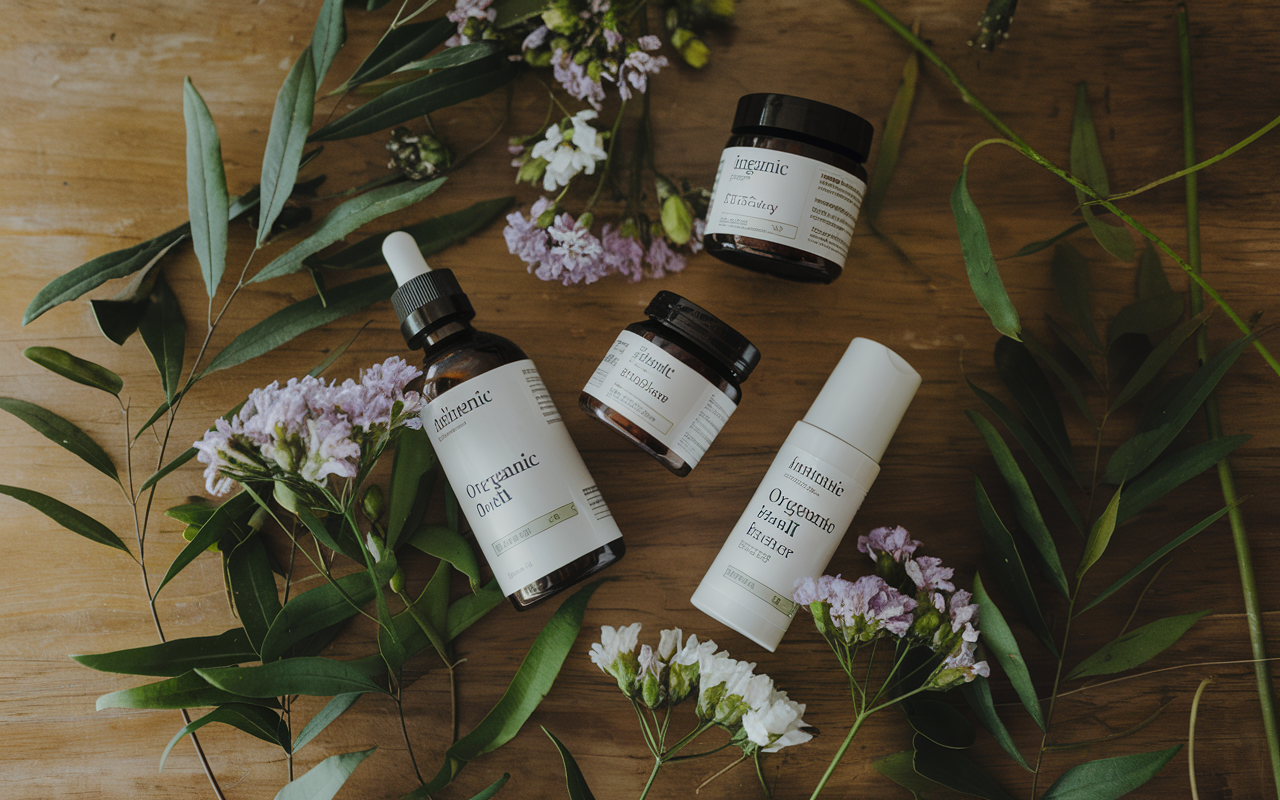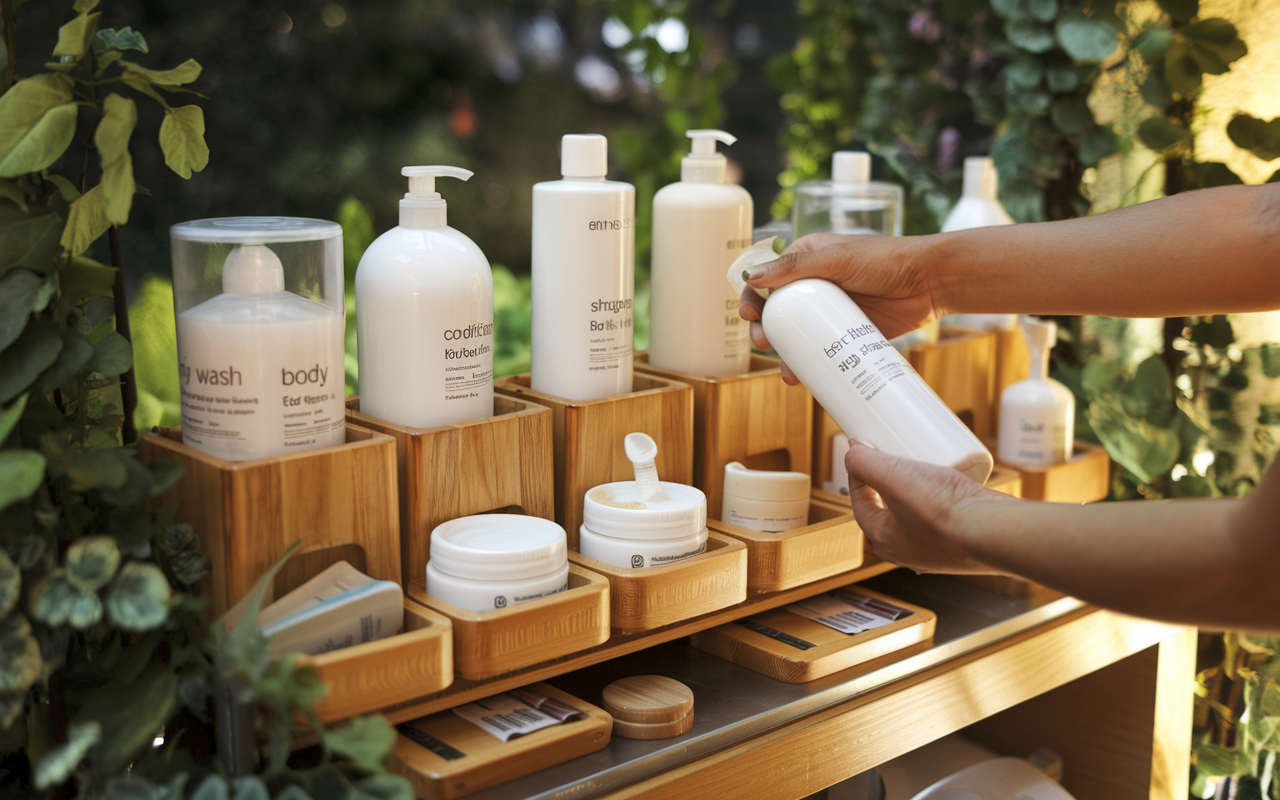
Introduction
Imagine walking through the beauty aisle, your eyes catching those serene green labels promising “organic skin care.” It feels like you’re making a conscious choice—for your skin and the planet. But is everything labeled “organic” as magical as it seems? The world of organic skin care is filled with myths that mislead consumers, causing confusion, disappointment, or even harm.
In this article, we’ll dive deep into the truth behind organic skin care, debunking common myths and arming you with the knowledge to make informed choices. Let’s uncover what organic skin care is—and isn’t—so you can truly nourish your skin and embrace sustainable beauty.
What Is Organic Skin Care?
Definition and Core Principles
Organic skin care is more than just a trendy buzzword—it’s a commitment to using ingredients derived from nature, free from harmful chemicals, synthetic pesticides, and GMOs. These products prioritize gentle, eco-friendly practices that protect both your skin and the environment.
The Growing Popularity of Organic Skin Care
Why has organic skin care become so popular? Consumers are increasingly conscious of what they put on their skin, seeking alternatives to chemical-laden products. Organic options promise purity, safety, and harmony with nature. But as with any industry, not all claims are created equal.
Common Myths About Organic Skin Care
“Organic Means 100% Safe for Everyone”
Many believe that organic equals harmless. While organic products avoid harsh synthetic chemicals, natural ingredients can still trigger reactions, especially in sensitive skin. Remember, poison ivy is natural too, but that doesn’t make it safe for skincare!
“Organic Products Are Always Better Than Synthetic Ones”
The assumption that organic is always superior isn’t accurate. Synthetic ingredients like hyaluronic acid or retinol are scientifically proven to benefit skin health and can often work alongside natural components for optimal results.
“Natural Ingredients Never Cause Allergies”
Organic skin care isn’t allergy-proof. Ingredients like essential oils (lavender, tea tree) or fruit extracts can irritate sensitive skin or cause allergic reactions. Patch testing is crucial—even for organic products.
“All Organic Products Are Certified”
Certification standards vary globally, and not every product labeled “organic” meets stringent criteria. Some brands misuse the term as a marketing ploy. Always check for trusted certifications like USDA Organic or ECOCERT.
“Organic Skin Care Is Too Expensive”
While high-end organic products can be pricey, many affordable options are available. Price doesn’t always equate to quality, so it’s worth researching and experimenting to find products that fit your budget and skin needs.
Debunking Myths Surrounding Organic Skin Care
Understanding Skin Sensitivity
Every individual’s skin is unique, and organic skin care doesn’t guarantee compatibility. Even seemingly harmless ingredients like chamomile or rosehip oil can irritate specific skin types.
Organic vs. Synthetic: A Balanced Perspective
The organic vs. synthetic debate isn’t black and white. For example, synthetic peptides in anti-aging creams complement the natural antioxidants in organic oils. Embracing a combination of science and nature often yields the best results.
Certification: The Key to Authenticity
Without certification, it’s challenging to determine if a product is genuinely organic. Certifications ensure that products meet rigorous standards, protecting consumers from misleading claims.
The Science Behind Organic Skin Care
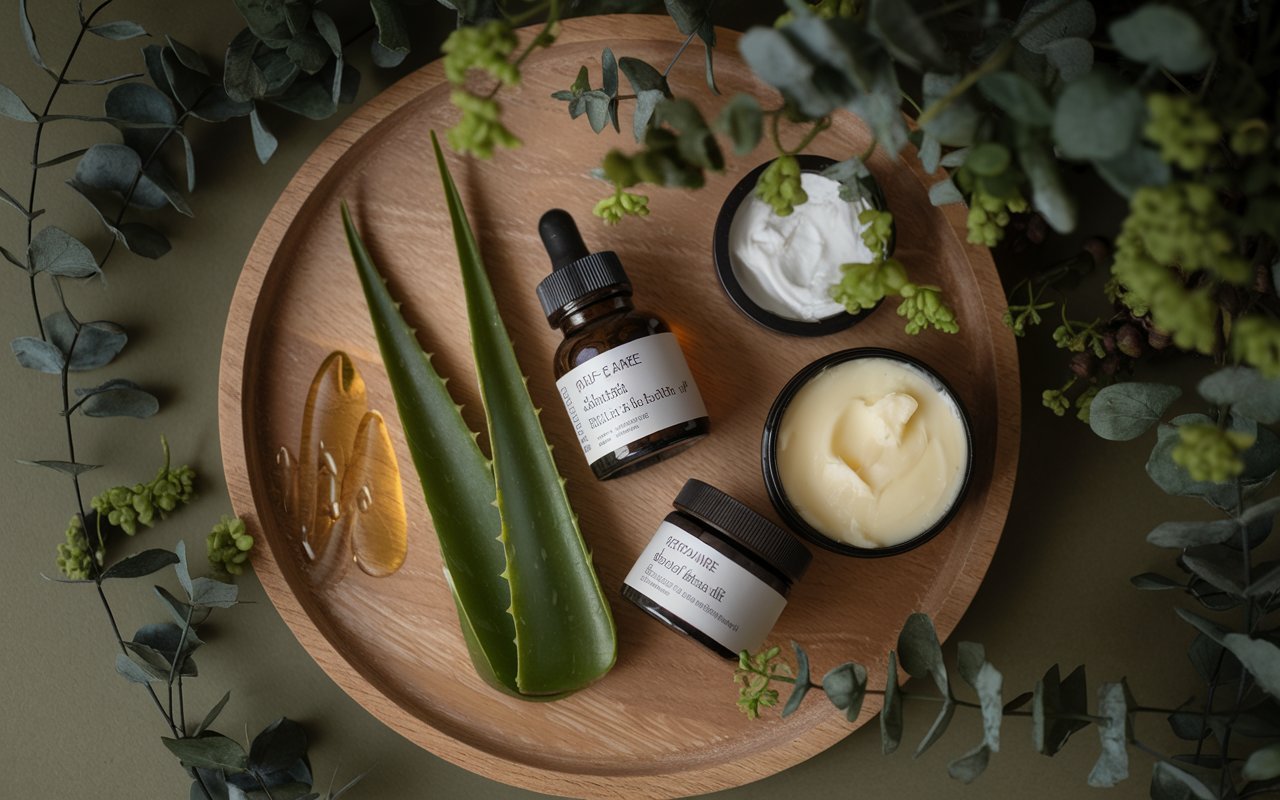
Key Ingredients and Their Benefits
Organic skin care harnesses the power of nature, and many of its key ingredients offer remarkable benefits for the skin:
- Aloe Vera: Revered for centuries, aloe vera soothes inflammation, reduces redness, and deeply hydrates the skin. Its cooling properties make it a favorite for sunburn relief and irritated skin.
- Shea Butter: A gift from the African karité tree, shea butter is packed with vitamins A, E, and essential fatty acids. It not only softens skin but also creates a protective barrier, locking in moisture for hours.
- Green Tea Extract: This antioxidant-rich ingredient fights free radicals that lead to premature aging. It also reduces inflammation and calms acne-prone skin, making it a multitasking wonder.
- Jojoba Oil: Known for its uncanny similarity to the skin’s natural sebum, jojoba oil balances oil production. It’s lightweight, non-comedogenic, and ideal for both dry and oily skin types.
- Rosehip Oil: Packed with vitamins A and C, rosehip oil supports skin regeneration, reduces the appearance of scars, and brightens dull complexions.
- Chamomile Extract: With its anti-inflammatory and antimicrobial properties, chamomile is perfect for soothing sensitive skin and reducing redness.
- Coconut Oil: While deeply moisturizing, coconut oil also has antibacterial properties. However, it works best for dry skin types and should be used sparingly on oily skin to avoid clogging pores.
- Honey: Honey, a humectant found in nature, hydrates the skin. Its antibacterial properties also make it effective for acne treatment and wound healing.
Potential Risks of Organic Skin Care Misuse
Even the best organic ingredients can have unintended consequences if misused. Here’s what to watch out for:
- Undiluted Essential Oils: While essential oils like tea tree or lavender are potent, applying them directly to the skin can cause burns, irritation, or heightened sensitivity. Always dilute them with a carrier oil.
- Over-Exfoliation with Natural Scrubs: Ingredients like sugar or salt can be too abrasive if used frequently. They can cause micro-tears in the skin, leading to irritation and a compromised skin barrier.
- Photosensitivity from Citrus Oils: Organic products containing lemon, lime, or orange oils can make your skin more sensitive to the sun, increasing the risk of sunburn and pigmentation.
- Allergic Reactions: Even natural ingredients like nuts, fruits, or floral extracts can trigger allergies in some individuals. To make sure the product is safe for your skin, do a patch test.
- Storage and Expiry Issues: Organic products often lack synthetic preservatives, which means they can spoil faster. Storing them in cool, dry places is essential to prevent bacterial growth and contamination.
- Layering Incompatible Ingredients: Combining certain organic products with active ingredients like retinol or AHAs can lead to irritation. Be mindful of how products interact.
By understanding these risks, you can harness the benefits of organic skin care while avoiding common pitfalls. Treat your skin with the same care and respect you’d give to a delicate plant—nurturing it gently and thoughtfully.
How to Select the Right Organic Skin Care Products

Navigating the world of organic skin care can feel overwhelming, but with the right guidance, you can make informed choices that truly benefit your skin.
Reading and Understanding Labels
When it comes to organic skin care, marketing buzzwords like “natural,” “pure,” or even “organic” are often thrown around without much regulation. This is why understanding how to read labels is critical.
- Scrutinize the Ingredient List: The first few ingredients listed make up the bulk of the product. Ensure these are genuinely organic or plant-based. Avoid products loaded with synthetic chemicals or fragrances.
- Look for Certifications: Trust reputable certifications like USDA Organic, COSMOS Organic, or Ecocert. These labels ensure the product has met stringent organic standards.
- Understand Terms: Words like “natural” don’t always mean organic, and “organic” doesn’t always mean 100%. Products can claim to be organic even if they only contain a small percentage of organic ingredients.
- Beware of Greenwashing: Just because a product is packaged in earthy tones or says it’s “eco-friendly” doesn’t mean it’s genuinely organic. Dive deeper into the brand’s claims.
- Expiration Dates Matter: Organic products often lack synthetic preservatives, so their shelf life is shorter. Check for expiration dates and avoid buying products that seem too close to their expiry.
Identifying Your Skin Type
Understanding your skin type is the cornerstone of selecting effective organic skin care products. Organic doesn’t mean it’s universally suitable—your unique needs matter.
- Oily Skin: If your skin tends to produce excess oil, look for lightweight, non-comedogenic products. Ingredients like witch hazel, tea tree oil, and aloe vera are excellent for reducing irritation and managing sebum.
- Dry Skin: Rich, hydrating ingredients like shea butter, coconut oil, and avocado oil work wonders for locking in moisture and restoring a healthy glow.
- Combination Skin: For this tricky skin type, focus on balancing products. Jojoba oil, rosehip oil, and green tea extract are great for nourishing dry areas while keeping oily zones in check.
- Sensitive Skin: To prevent irritation, choose products with minimal ingredients. Calming substances such as oat extract, calendula, and chamomile are mild and soothing.
- Acne-Prone Skin: Ingredients like salicylic acid from willow bark, honey, and green tea can help reduce breakouts while keeping the skin calm.
Patch Testing Is Key
Before committing to any organic skin care product, patch testing is non-negotiable. Apply a small amount of the product on your inner wrist or behind your ear, and wait 24-48 hours to see if there’s any reaction. Even the purest ingredients can sometimes trigger sensitivities.
Avoid Overloading Your Routine
When it comes to organic skin care, less is often more. Instead of layering multiple products, opt for a few high-quality items that address your skin’s specific needs. Overloading your skin can lead to clogged pores, breakouts, or irritation, even with organic products.
By taking the time to understand your skin and carefully selecting products that align with your needs, you’ll be one step closer to achieving radiant, healthy skin—naturally and organically.
Benefits of Organic Skin Care When Used Properly
Nourishment without Harsh Chemicals
Organic products often exclude synthetic preservatives and fragrances, which can irritate the skin. This makes them a gentler alternative for those seeking a more natural approach.
Sustainability for the Planet
By choosing organic skin care, you support farming practices that protect the environment. It benefits both the environment and your skin.
Holistic Approach to Skin Health
Organic skin care often integrates wellness philosophies, encouraging mindful self-care practices that go beyond external beauty.
Navigating Misleading Claims in Organic Skin Care
Spotting Greenwashing
Greenwashing is when brands exaggerate their eco-friendly claims. Beware of vague terms like “green” or “eco-conscious” without clear evidence or certifications to back them up.
Patch Testing for Safety
Even organic products require testing. Apply a small amount to a patch of skin before full use to ensure compatibility.
The Future of Organic Skin Care
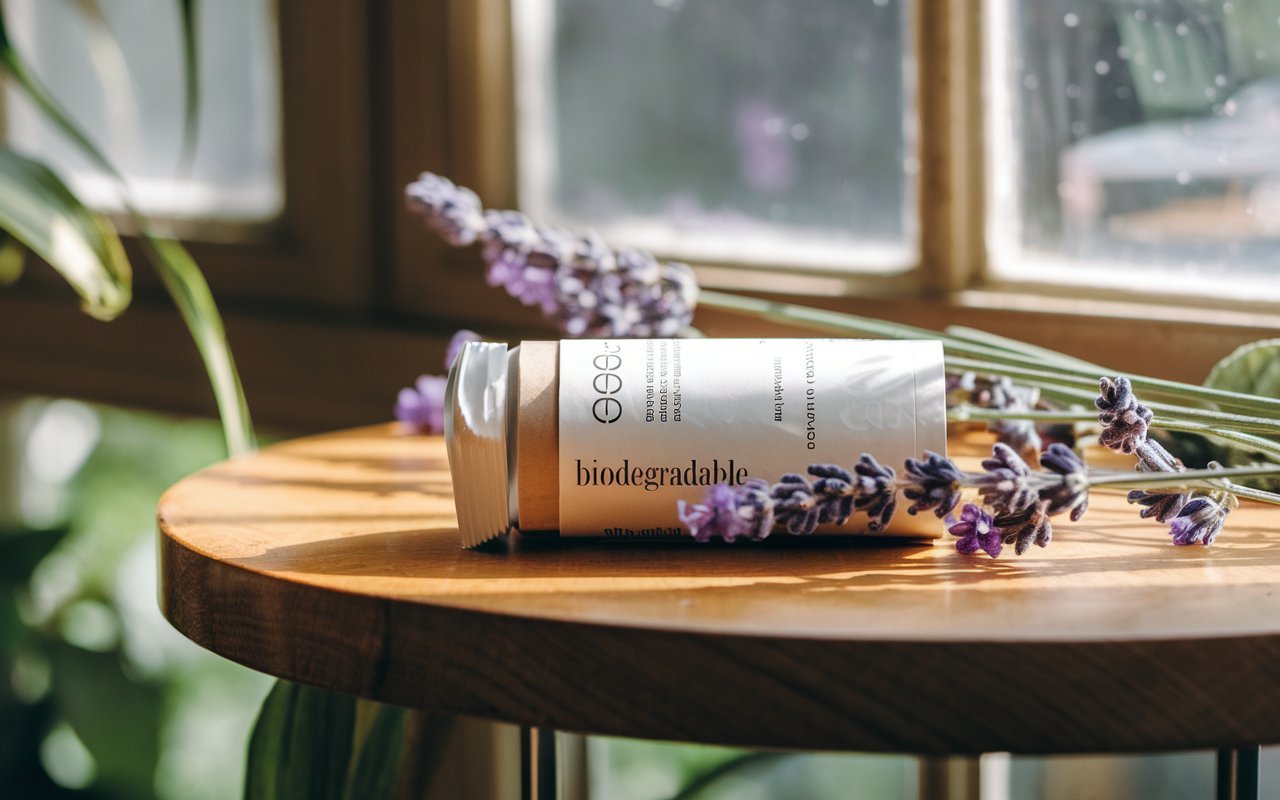
The organic skin care industry is more than just a passing trend; it’s a movement that reflects our collective desire for healthier, more sustainable living. As awareness about the benefits of organic skin care grows, so too does the innovation within the industry. The future holds exciting developments that promise to revolutionize how we care for our skin and the planet.
Innovations in Sustainable Sourcing
The demand for ethical and environmentally friendly products is pushing brands to rethink their sourcing methods. Future advancements include:
- Eco-Friendly Farming: Organic farming techniques that use less water, reduce soil erosion, and eliminate harmful pesticides are becoming the norm. Brands are now collaborating with small-scale farmers to ensure sustainable practices.
- Wildcrafted Ingredients: Harvesting plants from their natural habitats in a sustainable manner ensures potency while preserving biodiversity.
- Biotechnology in Nature: Scientists are studying how to replicate beneficial plant compounds in labs to reduce the strain on natural resources. This approach balances the need for organic ingredients with environmental preservation.
Biodegradable and Zero-Waste Packaging
Waste from packaging is a major issue in the cosmetics sector. The future of organic skin care is paving the way for:
- Compostable Materials: Innovative materials, such as mushroom-based packaging and plant-derived plastics, are being explored to reduce waste.
- Refill Systems: More brands are adopting refill stations and reusable containers to minimize packaging waste. This allows consumers to replenish their favorite products without creating more trash.
- Minimalistic Design: Simplified packaging that uses fewer materials while maintaining product safety is gaining traction.
Hybrid Products: Bridging Nature and Science
As consumers demand efficacy alongside purity, the future of organic skin care lies in hybrid products. These combine the best of both worlds:
- Nature Meets Innovation: Products that blend organic ingredients with cutting-edge, safe synthetic components to enhance performance are becoming a game-changer. For example, combining plant extracts with bioengineered peptides for anti-aging benefits.
- Targeted Solutions: Advances in personalized skin care mean organic products tailored to individual DNA, microbiomes, and lifestyle factors could become mainstream.
- Smart Skincare: Technology such as AI and wearable devices may soon guide consumers toward the most effective organic solutions for their unique skin needs.
Focus on Diversity and Inclusivity
The future of organic skin care is inclusive. Brands are creating products that cater to all skin tones, types, and concerns, ensuring that no one is left behind in the organic beauty revolution. Expect:
- Formulations for Melanin-Rich Skin: More products designed to address hyperpigmentation and other unique challenges faced by darker skin tones.
- Universal Products: Ingredients and formulations that work across a variety of skin types without compromising effectiveness.
Holistic Wellness Integration
Organic skin care is evolving to embrace the concept of holistic beauty, blending external care with internal wellness:
- Adaptogenic Skincare: Products infused with adaptogens like ashwagandha and reishi mushrooms to help the skin combat stressors.
- Skin-Nutrition Synergy: An increased focus on pairing topical products with ingestible supplements, like collagen powders and antioxidant-rich capsules, to nourish the skin from within.
- Mindful Beauty Rituals: Encouraging self-care practices like facial massages, meditation, and aromatherapy to enhance the organic skin care experience.
Ethical Consumerism and Transparency
The future of organic skin care is as much about ethical practices as it is about efficacy. Consumers are demanding:
- Transparency: Brands are providing detailed ingredient sourcing information, from farm to bottle, ensuring authenticity and trust.
- Cruelty-Free Innovation: With advancements in technology, expect more breakthroughs in cruelty-free testing methods, making animal testing obsolete.
- Community Support: Ethical brands are partnering with local communities, reinvesting profits to improve livelihoods and environmental stewardship.
Driving a Global Movement
Organic skin care is not just a personal choice—it’s becoming a global movement toward sustainability, health, and empowerment. As more people recognize its importance, this industry is poised to lead the charge in redefining beauty standards.
The future of organic skin care is bright, filled with possibilities that honor nature, protect the environment, and celebrate individuality. It’s not just about looking good; it’s about feeling good, inside and out, while contributing to a healthier planet.
Conclusion
Organic skin care offers immense benefits, but it’s not without its complexities. By debunking myths and understanding the truth behind labels, you can make informed choices that nurture your skin and protect the environment. Remember, the goal is not perfection but balance—choosing products that align with your values and meet your skin’s unique needs.
FAQs
Q: Are organic skin care products suitable for everyone?
A: No, organic products can still cause reactions depending on individual sensitivities.
Q: How can I identify genuine organic skin care products?
A: Look for certifications like USDA Organic or ECOCERT on the label.
Q: Why do some organic products cost more?
A: Organic farming and sustainable practices often involve higher costs, reflected in the product price.
Q: Do organic products expire faster?
A: Yes, without synthetic preservatives, organic products typically have shorter shelf lives.
Q: Can organic skin care be part of an anti-aging routine?
A: Absolutely! Ingredients like rosehip oil and green tea extract offer excellent anti-aging benefits.
Also Visit:
How to Tell if Your Organic Skin Care Products Are Truly Transforming Your Skin 2024
Can Organic Skin Care Help with Acne? Discover What You Need to Know 2024
The Ultimate Way to Spot Fake Organic Skin Care Products in 2024 and Protect Your Skin

